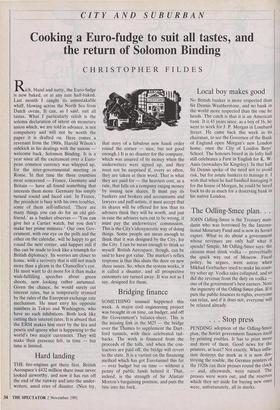Hard landing
THE fire-engines got there first. British Aerospace's £432 million share issue never looked airworthy, and now it has run off the end of the runway and into the under- writers, amid cries of disaster. (Nice try, that story of a fabulous new Saudi order round the corner — nice, but not good enough.) It is no disaster for the company, which was assured of its money when the underwriters were signed up, and they must not be surprised if, every so often, they are taken at their word. That is what they are paid for — the heaviest cost; as a rule, that falls on a company raisjng money by issuing new shares. It must pay its bankers and brokers and accountants and lawyers and puff-artists, it must accept that its shares will be offered for less than its advisers think they will be worth, and just in case the advisers turn out to be wrong, it must pay the underwriters' commission. This is the City's idiosyncratic way of doing things. Some people are mean enough to think that it was designed by the City, for the City. I can be mean enough to think so myself. British Aerospace, though, can be said to have got value. The market's reflex response is that this shuts the door on new share issues. So, when the system works, it is called a disaster, and all prospective customers are turned away. It was not as I say, designed for them.


































































 Previous page
Previous page